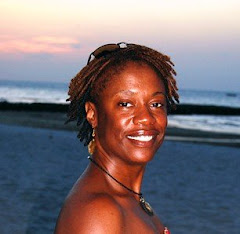 How many researchers does it take to switch on the "lightbulb" of insight about the benefits of learning to talk to reporters?
How many researchers does it take to switch on the "lightbulb" of insight about the benefits of learning to talk to reporters? About 20. And it really helps when one of them is the lead researcher on the Pneumococcal Conjugate Vaccine Impact Study (PCVIS), Dr. Anthony Scott.
“Picture it: October 2010, a small conference room at the KEMRI-Wellcome Trust Research Programme in Kilifi.” (And yes, I was just channeling Sophia Petrillo for a minute.) I’m about to start my Power Point Presentation, “Communicating Research Through the Media: It Ain’t Rocket Science!” when I realized I could use a photo to illustrate a blog post about the event.
When the guy sitting in the chair beside my backpack graciously offered to help, I smiled and introduced myself while proffering my trusty little pink point-and-shoot camera. When he told me his name, I literally had stop myself from shouting, “NO WAY!”! I had been trying to connect with Anthony Scott for at least the past month and a half, ever since I’d learned that the pneumococcal vaccine developed at KEMRI-Wellcome Trust Kilifi was scheduled to be officially released in January 2011.
I learned that fact at about the same time I received the Wellcome Trust Public Engagement grant for the Kenyan Alliance of Health And Science Reporters project. That coincidence offered the perfect opportunity to use this important research milestone as a training tool. I quickly decided that the first KAHSR week-long workshop should be held in Kilifi, and it should focus on the PCVIS process.
What a terrific opportunity for an immersion training that would also prepare Kenyan reporters to authoritatively cover the official vaccine release! If only I could snag just a few minutes on Dr. Scott's incredibly busy schedule, to learn more about the project and get his feedback on possible workshop sessions!
(“And I’d just shoved my trusty little pink point-and-shoot camera in his face! ARRRRGGGHHH!”)
Fortunately, Dr. Scott seems like a really nice guy who wasn’t fazed by my stunningly informal introduction. In fact, he seemed to enjoy the presentation, and is quite eager to help me develop the workshop program, scheduled for the end of November.
It will help Kenyan print reporters understand why the Government agreed to work with KEMRI-Wellcome Trust researchers to monitor the effectiveness of the Pneumococcal Conjugate Vaccine over the past four years. It targets the "pneumococcus" bacterium that causes pneumonia, meningitis and sepsis in children.
Even before I knew just HOW big a deal this vaccine launch is, I somehow understood the enormous opportunity it presents. It offers a chance to teach reporters about the process of research—what’s a randomized clinical trial? How do you convince an illiterate, impoverished mother to let you jab her baby with an alien substance? How did the official pneumoccal disease burden in Kenya convince the Government that this research project was worth supporting?
So I’m glad I was bold enough to shove my trusty little pink point-and-shoot at one of those researchers who'd taken time to flip that mental switch. It could light the path toward more and better communication between journalists and scientists. As with most “rocket science,” the only way forward is upward.





No comments:
Post a Comment